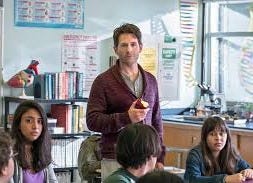Lessons in Futility
'A.P. Bio' depicts mediocrity as a way of life
Amid my nightly wanderings across the streaming landscape, I’ve paused in the last week or so to watch A.P. Bio, originally an NBC series (2018-2021) that was recently picked up by Netflix. The show, which has strong Saturday Night Live fingerprints on it (Lorne Michaels, Seth Meyers, cameos by current and former cast members) stars Glenn Howerton as a former Harvard philosophy professor who takes a teaching job in his hometown of Toledo while enlisting his students to plot revenge on the colleague who got him fired. Patton Oswald plays the hapless principal who seeks his approval even as he resists his employee’s often outrageous antics and snobbery.
A.P Bio is a mildly diverting show that’s usually good for a chuckle or two per episode. But what’s really striking about it—dismayingly so—is how its sturdy sitcom conventions capture a life in school that’s been stunningly static for at least the half-century since Welcome Back Kotter ran on ABC from 1975-1979 (I had a student who wrote a research essay about it and so saw she show again recently). Such shows are of course satires that take all kinds of liberties in representing school life, beginning with their casts, who are always older than the students they portray. But here in the 2020s, A.P. Bio depicts realities that remain in place despite decades of reform efforts: the solo teacher operating without supervision behind a closed door; the series of regulations—from prescribed lesson plans to clock-punching—that ineffectually regulate their behavior; the counter-pressures of teachers unions that regulate the regulators into impotence; the corrupt bargain between students and teachers not to tax each other unduly (in the series, the teacher says he will give As to all his students even though they won’t be learning any advanced placement biology, an arrangement many of the kids find frustrating but lack the leverage to contest).
I hasten to add that this scenario doesn’t describe my job, among other reasons because it’s at an independent school where market pressures are strong enough to provide a modicum of accountability. Yet the underlying dynamics here are not hard to recognize as familiar. Indeed, the premise of a show like A.P. Bio is not really to make a critique of public education but instead to offer what is essentially a workplace comedy in that viewers can laugh at the mediocrity, corner-cutting, and idiocy that the rank-and-file experiences every day. As such, it has a working-class thrust, even if the job of teaching continues to occupy a liminal zone between employee and professional. And as such, it is engaged in a little pandering, since flattering audiences is often the key to keeping them. Which is why, I suppose, I’m still watching A.P. Bio. But like a teacher on the lookout for a better perch, I’ll keep checking the postings on Netflix to see if something better comes along.


Horace’s Compromise by Ted Sizer comes to mind. Reading that tragic book was my first step out of public education, something I thought I would never do.
Andrew Niblock and I did a presentation at NAIS Conference 2012. It was titled “Measuring What We Value”. It gave examples of “Old Smart vs New Smart”. The intro slide on “Old Smart” was an A. P. Biology text.
Your entry today brought back a terrific memory. God I miss him.